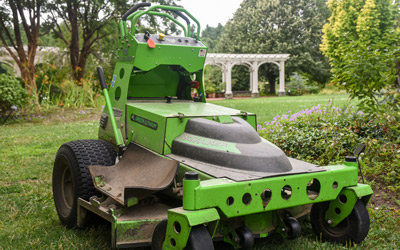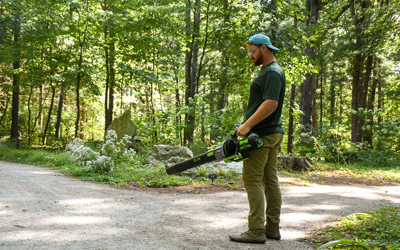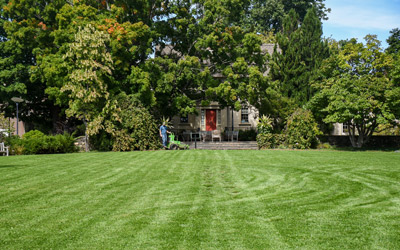AGZA Green Zone Certification
Thanks to the American Green Zone Alliance (AGZA) and Quiet Communities, New England Botanic Garden is the first botanic garden in the country with a Green Zone Certification.
What is an AGZA Green Zone?
An AGZA Green Zone is one in which routine maintenance is performed with low impact equipment.
AGZA Green Zone Certification helps organizations improve and strengthen environmental leadership by setting an example for clean, quiet, and sustainable landscape maintenance practices in their community.
In order to receive Green Zone certification, organizations focus on replacing two-stroke gas powered landscape equipment, tools that have the highest impact on the environment, with equipment that produces fewer emissions or zero emissions and less noise pollution. Examples of this equipment includes chainsaws, leaf blowers, string trimmers, and lawn mowers.
AGZA and Quiet Communities work closely with organizations, companies, and municipalities throughout the certification process—offering expertise on equipment, providing education on servicing, and connecting green industry professionals with resources and references to help the transition run smoothly.
The Garden’s Green Zone Journey
New England Botanic Garden has a long and proud history of celebrating both the art and the science of horticulture. Sustainable initiatives have been introduced through various projects over the years. Green Zone certification is the first to be completed following the approval of the Garden’s Strategic Plan in June 2020.
The Strategic Plan pushes us to take our horticultural practices to the next level and look at our collections through a climate change and resiliency lens. This means weaving sustainable practices through landscape operations, as well as effectively conserving and managing the wild edges that surround our formal gardens.
The Garden began its Green Zone journey in 2019. Before partnering with AGZA, horticulture staff were already researching and demoing electric equipment with hopes of transitioning the Garden toward more sustainable maintenance practices. Learn more about this process at our blog.
In September 2020, Garden staff connected with AGZA founder Dan Mabe at an electric equipment workshop. In the months that followed, AGZA worked alongside Garden staff to determine what products would best suit the needs of the horticulture team and the landscape of the Garden. The organization then helped calculate the Garden’s current carbon footprint, and the change that would result from the transition to electric equipment.
After a series of discussions and planning sessions, the Garden officially committed to becoming a Green Zone in April 2021
Flipping the Switch to Celebrate Our Green Zone Achievement
On October 27, 2022, a group of local, regional, and national leaders on issues of climate change and sustainability gathered on the Garden’s Jeppson Terrace to celebrate our AGZA Green Zone recognition and spotlight our ongoing efforts to decarbonize. Instead of commemorating this important milestone with a ribbon cutting, Congressman Jim McGovern (D-MA), Representative Michelle Ciccolo, Mayor Joe Petty, Dan Mabe of AGZA, Jamie Banks of Quiet Communities, and the Garden’s Grace Elton, CEO, Mark Richardson, Director of Horticulture, and Robert Graham, Land Steward, turned on a giant light switch, a symbol of the Garden’s transition to electric landscaping equipment.
“What you have accomplished, in addition to setting a good example, actually increases the pressure on the powers that be that we need to move faster, and we need to be bolder in the actions that we take,” said Congressman Jim McGovern. “Your choice to aim for this certification isn’t just good news for our planet, but it makes you even better neighbors. You’re contributing to cleaner air and protecting the local ecosystem, and all of us benefit.”
You can listen to all remarks made at this special celebration, here.
Each day, the Garden continues to make strides toward becoming more sustainable. Click here to learn about our Sustainable Initiatives. We hope to be a resource to other institutions, municipalities, or green industry professionals looking to make sustainable transitions on their properties.




